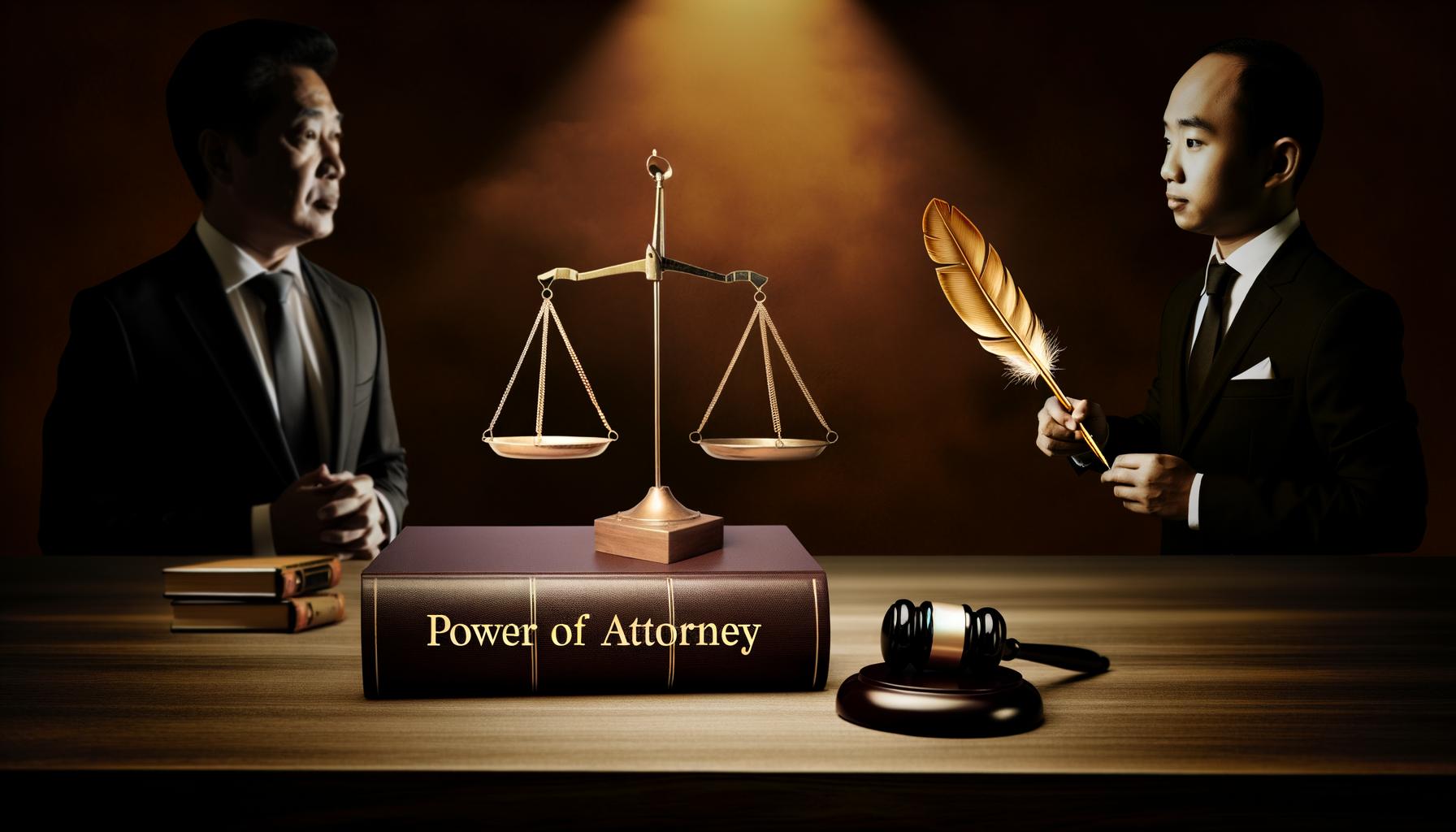Understanding the power of attorney is crucial, especially for seniors living in Huntington Beach. A power of attorney (POA) is a legal document that allows one person to make decisions on behalf of another, covering areas like finances, healthcare, and more. The importance of having a POA becomes particularly pronounced for seniors as they may face situations where they cannot make their own decisions due to age-related issues or unforeseen medical emergencies.
For seniors in Huntington Beach, securing a power of attorney can offer significant peace of mind. As the golden years approach, it’s essential to plan for future contingencies to ensure that personal wishes are honored and to avoid potential legal battles among family members.
Huntington Beach has its unique charm and lifestyle needs which make understanding the specifics of POA even more vital. Seniors here not only want to enjoy their beachside retirement but also need the assurance that someone trusted will act in their best interest when necessary.
Navigating the complexities of establishing a power of attorney might seem daunting initially; however, it remains an indispensable part of long-term planning. From protecting financial assets to making critical healthcare decisions, a well-drafted POA tailored to individual needs can be the cornerstone that supports this phase of life with dignity and security. With the right preparation and understanding specific to California laws, Huntington Beach seniors can ensure they are well-protected against any eventuality.
Types of Power of Attorney
Power of Attorney (POA) can be categorized into several types, each catering to different aspects of a person’s needs and circumstances. Understanding these variations is crucial for Huntington Beach seniors to ensure they choose the right type that aligns with their specific requirements.
First, the General Power of Attorney grants broad powers to an agent or representative. This authorization encompasses almost every financial and legal decision, including managing bank accounts, signing checks, selling property, and handling investments.
However, the General POA ceases to be effective if the principal becomes incapacitated unless it is specified as “durable.” For seniors in Huntington Beach who may not anticipate immediate health issues but still want someone trusted to handle their affairs when necessary, this can be a viable option.
The Durable Power of Attorney remains in effect even if the principal becomes mentally incapacitated. This durability feature ensures ongoing management of financial matters without interruption during unforeseen medical emergencies or mental health declines. This continuity is particularly important for seniors wishing to ensure their assets are managed consistently without needing court intervention for guardianship or conservatorship.
Another critical type is the Medical Power of Attorney, which specifically focuses on healthcare decisions. In this arrangement, an appointed agent can make medical choices on behalf of the principal if they are unable to communicate or make informed decisions themselves. Considering the prominence of wellness and active living within the Huntington Beach senior community, having a Medical POA enables seniors to maintain control over their healthcare preferences even when they cannot voice them personally.
Lastly, the Financial Power of Attorney allows an appointed agent to handle economic affairs similarly to a general type but strictly confines these powers to financial concerns alone. For those seniors who remain deeply involved in their personal care decisions yet prefer delegation on financial matters due to complexity or comfort reasons, this selective delegation could simplify life significantly.
To summarize:
- General POA: Broad legal and financial authority; not valid upon incapacity unless stated.
- Durable POA: Continues through incapacitation; vital for uninterrupted management.
- Medical POA: Focuses solely on healthcare decisions; crucial for expressing medical wishes.
- Financial POA: Constrained purely within financial management; useful for detailed fiscal oversight.
Selecting among these options requires careful contemplation about current lifestyles and future expectations specific to one’s circumstances in Huntington Beach. Consulting with a knowledgeable advisor can clarify which type fits best while addressing any doubts regarding establishing a power of attorney tailored perfectly for individual needs.
Legal Requirements in California
California law has specific regulations that must be adhered to when setting up a power of attorney. One of the first steps is ensuring that the document complies with state mandates, which include being executed by a competent adult-someone at least 18 years old and of sound mind.
In Huntington Beach, as in the rest of California, the document must be either notarized or signed by two witnesses. This serves to verify the authenticity of the principal’s signature and their intent to establish a POA.
Moreover, it’s crucial for seniors in Huntington Beach to understand the different forms used within California. The statutory form provided by the California Probate Code is often recommended for its clarity and comprehensive coverage. If opting for this form, make sure it accurately represents your intentions and provides clear instructions regarding decisions around health care, finances, or other areas as stipulated in your POA.

Ensuring all necessary documentation is meticulously completed can prevent future complications. It is advised to file these documents properly, retaining copies in easily accessible yet secure locations. Some seniors opt to register their POA with institutions like financial entities or medical providers beforehand to ensure smooth operation when immediate decision-making is required. Legal counsel specializing in elder law can provide invaluable guidance through this process, guaranteeing all local requirements are impeccably met.
| Requirement | Details |
|---|---|
| Age and Competency | Must be at least 18 years old and of sound mind |
| Signatures | Notarized or signed by two witnesses |
| Documentation | Completed statutory form as per California Probate Code |
Failure to meet these legal stipulations could render a power of attorney invalid, leaving seniors without critical support during emergencies. Therefore, investing time into understanding these requirements and correctly executing them can significantly contribute to more effective estate planning and personal preparedness.
Choosing the Right Agent
Selecting the right agent to hold your power of attorney (POA) is one of the most critical decisions you will make as a senior in Huntington Beach. This individual, often referred to as an agent or attorney-in-fact, will potentially make significant financial, medical, and personal decisions on your behalf.
Therefore, choosing someone who is trustworthy and reliable should be at the forefront of this decision-making process. It’s essential to consider aspects like their ability to remain calm under pressure, handle complex tasks, and understand your wishes thoroughly.
Factors to Consider
When choosing an agent for your power of attorney, trust and reliability are paramount. This person may have control over valuable assets and critical health care decisions; thus, integrity is non-negotiable. Additionally, knowledge about legal obligations associated with being an agent can help ensure they perform their duties effectively. Its advisable to select individuals who are financially literate if you’re looking into a financial POA or those familiar with healthcare systems when considering a medical POA.
Effective Communication
Another vital consideration is how well you communicate with this potential agent. Can you convey your wishes clearly? Do they ask questions that indicate they truly understand what you desire in various scenarios? Open lines of communication are crucial so that the chosen person can act in alignment with your values and preferences when the time comes. Scheduling regular discussions about expectations can provide both parties comfort and clarity regarding future decisions.
Family Dynamics
Lastly, never underestimate the influence of family dynamics on your choice. It may be tempting to choose a close relative purely based on familial obligation; however, consider whether this person is genuinely suited for such responsibilities.
An effective strategy might involve discussing the matter openly with family members to gauge their willingness and capability while minimizing potential sibling rivalries or misunderstandings later down the line. Establishing clear roles and documenting these discussions can also serve as an important reference point in times of need.
Common Mistakes and How to Avoid Them
One common mistake seniors make when setting up a power of attorney is choosing the wrong agent. Selecting an agent requires careful consideration of trust, reliability, and the ability to act in the senior’s best interests.
Unfortunately, some may appoint family members or friends without considering these critical factors, leading to potential conflicts or mismanagement. To avoid this, it is essential to thoroughly evaluate the prospective agent’s qualifications and have candid discussions about their willingness and capability to take on such a significant responsibility.
Another frequent error involves failing to update the power of attorney documents regularly. Life circumstances can change rapidly through health issues, relocation, or relationship dynamics; therefore, it’s crucial to review and possibly revise POA documents periodically. Neglecting this can result in outdated instructions that do not reflect current wishes or needs. Scheduled reviews with a legal advisor can help ensure that all documentation remains relevant and effective.
Seniors also often underestimate the importance of clear communication regarding their intentions and expectations for their agents. Without precise directives, an agent might be uncertain about how to handle particular situations, which could lead to decisions that do not align with the senior’s preferences.

Drafting comprehensive guidelines for managing medical care, financial transactions, and other personal matters can offer clearer insight into their desired outcomes. Engaging in open dialogues with chosen agents helps solidify mutual understanding and reinforce confidence in decision-making processes.
| Common Mistakes | Solutions |
|---|---|
| Choosing the wrong agent | Carefully evaluate trustworthiness and capability |
| Failing to update POA documents | Review and revise periodically |
| Lack of clear communication | Create detailed guidelines and engage in open dialogue |
Overall, being proactive about these potential pitfalls will help Huntington Beach seniors set up an effective power of attorney arrangement. Awareness and deliberate action can significantly reduce problems down the line-ensuring peace of mind for both seniors and their loved ones.
Benefits of Having a Power of Attorney
Having a power of attorney in place offers numerous advantages, particularly for seniors residing in Huntington Beach. One of the most significant benefits is the protection and peace of mind it provides for both seniors and their families.
When a power of attorney is designated, seniors can rest assured that their financial, medical, and personal affairs will be managed according to their wishes should they become unable to make decisions themselves. This legal document ensures that there are clear directives on who holds the authority to act on behalf of the senior, alleviating any potential confusion or disputes among family members.
Furthermore, having a power of attorney enables swift decision-making during emergencies. In critical situations where immediate action is required – such as sudden medical incidents or urgent financial matters – an appointed agent with the proper authority can handle these issues without delay. This rapid response capability prevents complications and ensures continuity in managing essential affairs. For example:
- An agent with medical power of attorney can quickly authorize treatments or consult with healthcare providers.
- A financial power of attorney can manage bills or access funds as needed.
Real-life examples vividly illustrate how beneficial having a power of attorney can be for Huntington Beach seniors. Take Mrs. Thompson, who had granted her daughter durable power of attorney before being diagnosed with Alzheimer’s disease. Her daughter was able to manage her finances efficiently and make necessary healthcare decisions while respecting Mrs. Thompson’s preferences. Without this arrangement, the family might have faced bureaucratic hurdles and delays during crucial moments.
In another instance, Mr. Johnson suffered a stroke unexpectedly but had given his best friend general power of attorney due to his estranged relationship with family members. His best friend could execute important transactions and arrange medical care immediately following the stroke, actions that were vital for Mr. Johnson’s recovery process and overall well-being.
The ability to designate trusted individuals to handle one’s important matters cannot be overstated – investing time now to establish a sound power of attorney can yield substantial dividends in security and preparedness in the future.
Resources and Assistance in Huntington Beach
Finding Legal Experts
Securing a power of attorney (POA) is a crucial step for seniors in Huntington Beach, and having access to knowledgeable legal professionals can make the process smoother. Local law firms often have attorneys who specialize in elder law, providing tailored advice regarding POA.
Some reputable Huntington Beach-based law firms include Meier Law Firm and Modern Wealth Law, both of which offer personalized consultations. These professionals can help ensure that all documents are correctly drafted and legally binding according to California state laws.
Community Organizations and Senior Centers
Huntington Beach also offers numerous community resources aimed at assisting seniors with their legal needs. Senior centers like the Michael E. Rodgers Seniors’ Center frequently host educational seminars and workshops on topics like POA, estate planning, and other elder law issues. Additionally, organizations such as Alzheimer’s Orange County provide resources specifically designed for families dealing with dementia or Alzheimer’s disease, underlining the significance of medical POAs.
Workshops and Seminars
For those looking to gain more knowledge before taking action, various workshops and seminars available throughout Huntington Beach can be invaluable. The Orange County Bar Association periodically conducts free or low-cost seminars covering essential aspects of establishing a power of attorney.
Libraries also offer informational sessions where experienced legal experts walk attendees through the steps to set up different types of POAs. Keep an eye on local event calendars or bulletin boards at community centers for announcements about upcoming events.
By leveraging these resources, Huntington Beach seniors can navigate the complexities of setting up a power of attorney with confidence and ease.
Conclusion and Next Steps
In conclusion, establishing a Power of Attorney (POA) is an essential step for seniors in Huntington Beach to ensure their affairs are handled according to their wishes. The peace of mind that comes from knowing that trusted individuals can make important decisions on your behalf cannot be overstated.

By now, you should understand the different types of POAs and the specific state laws in California that govern them, as well as how to select the right agent and avoid common mistakes.
We strongly encourage all seniors and their families to take proactive steps toward securing a POA. Delaying this critical task can lead to complications and stress during emergencies when swift decision-making is crucial. By setting up a POA, you not only protect your interests but also provide clear guidance for your loved ones during stressful times. Consider consulting with local legal professionals who specialize in elder law to ensure that your documents are properly drafted and legally binding.
Finally, Huntington Beach offers various resources and community support systems designed specifically for seniors navigating these legal waters. Whether through workshops, seminars, or direct consultations, there are ample opportunities to gain the necessary knowledge and assistance. Don’t hesitate to reach out to local legal advisors or services listed in our resource section-they can provide invaluable help as you complete this important aspect of future planning.
Frequently Asked Questions
What Are the Rules for Power of Attorney in California?
In California, the rules for Power of Attorney (POA) are governed by the California Probate Code. A POA document must be signed by the principal, or another person in the principal’s presence and at the principal’s direction. The signing needs to be acknowledged before a notary public or witnessed by two adults who are present simultaneously.
POAs can either be durable, remaining in effect if the principal becomes incapacitated, or nondurable, which end if the principal loses decisional capacity. Additionally, specific statutory forms may need to be used depending on the type of authority being granted.
What Is the Best Power of Attorney to Have?
There isn’t a one-size-fits-all answer when it comes to identifying the best Power of Attorney to have; it depends on individual needs and circumstances. Generally speaking, a Durable Power of Attorney is often considered advantageous because it remains effective even if the principal becomes incapacitated.
This ensures that decisions regarding financial matters can continue smoothly without needing court intervention for guardianship or conservatorship. However, it’s crucial to tailor any POA document carefully with legal counsel to fit particular situations appropriately.
What Is a Durable Power of Attorney in California?
A Durable Power of Attorney in California allows an appointed agent to make decisions on behalf of the principal even after they become incapacitated due to illness or injury. It remains valid until the principal’s death unless revoked earlier by drafting a revocation document while still competent.
This kind of POA provides security and continuity for handling financial affairs because it eliminates any gap in decision-making during periods of incapacity.
What Three Decisions Cannot Be Made by a Legal Power of Attorney?
Despite its broad authority, a Legal Power of Attorney cannot make certain critical decisions on behalf of the principal: these generally include voting in elections, making testamentary decisions such as creating or changing wills, and marriage-related actions like entering into marriage or filing for divorce on behalf of the principal.
These types of personal choices are considered too vital and intimate to delegate through a POA and must be made directly by individuals themselves.
Can a Power of Attorney Transfer Money to Themselves California?
In California, a Power of Attorney can transfer money to themselves under very restricted conditions specified in law and only when explicitly authorized within the POA document itself.
Generally speaking however self-dealing transactions—where agents benefit personally—are highly scrutinized due their potential conflicts-of-interest risks; thus they’re tightly regulated requiring clear written consent before any transferlike this occurs ensuring principals’ intentions are accurately represented thereby avoiding misuses exploitation pitfalls typically associated these situations legally restrained policywise strictly reinforcing protective measures safeguarding overall responsibility ethical integrity fiduciary agents correspondingly adherence compliance probity principlesropaely regulating vividly discernible practicable actionable terms forthrightness effectuated observance ensuring prudentially systematic fairness unavoidable necessary transparency integral guideline augmented stringently thorough methodologies reinforced prominenced evidentially prioritized indispensable procedural substantiveness rigorous assessments appropriate enforceability objectively consistently compelling consequential unequivocal supportive propriety equitable contractual undertakings effectively implemented consistent intents enshrined intents judiciously rationalized equitable effective responsibly actionable verifiable authentic actualized conscientiously ethically compliant documented factually proficiently executed procedural functionalities systematically bar safeguards rules adaptable comprehensive articulate concise?

